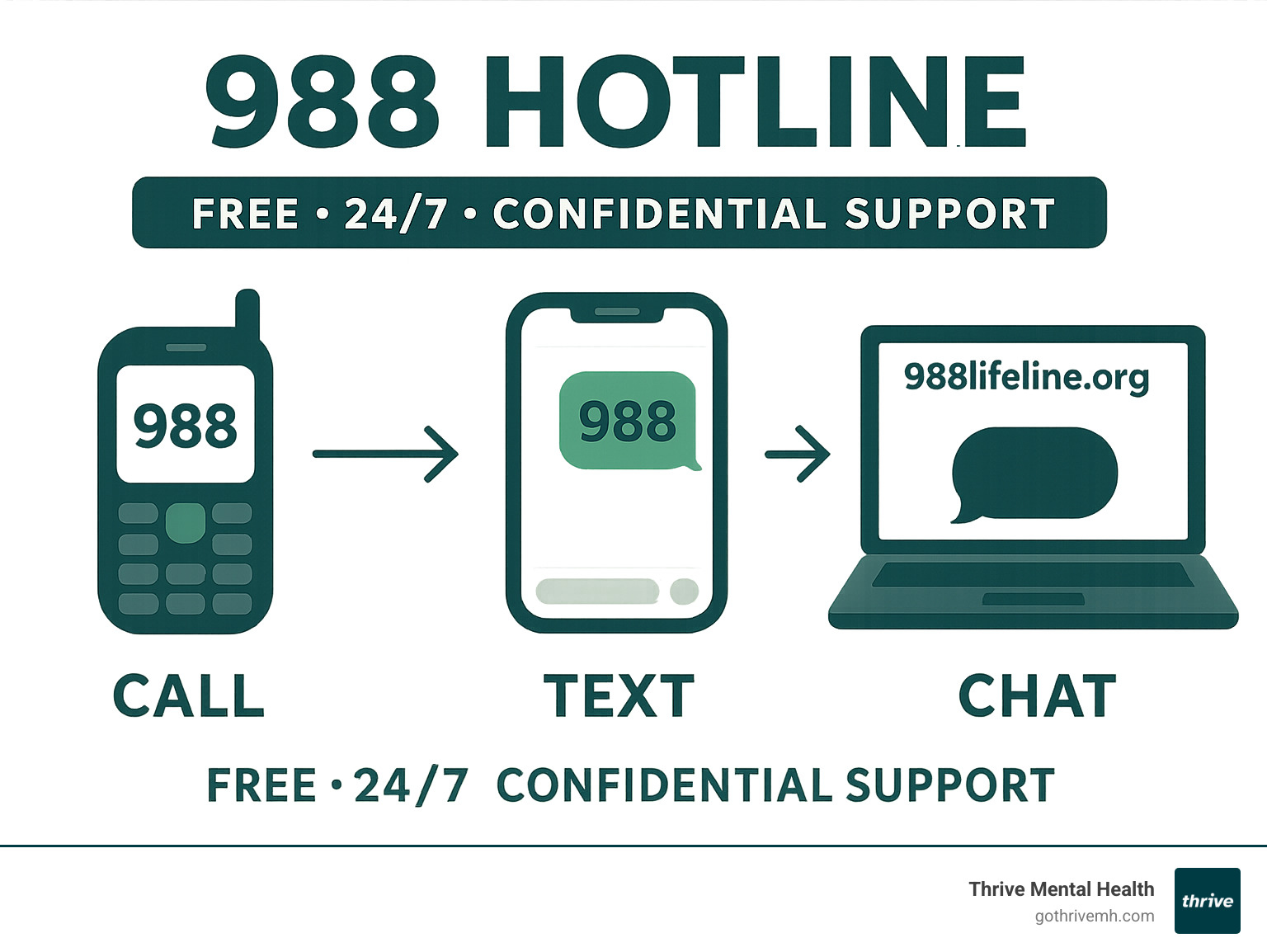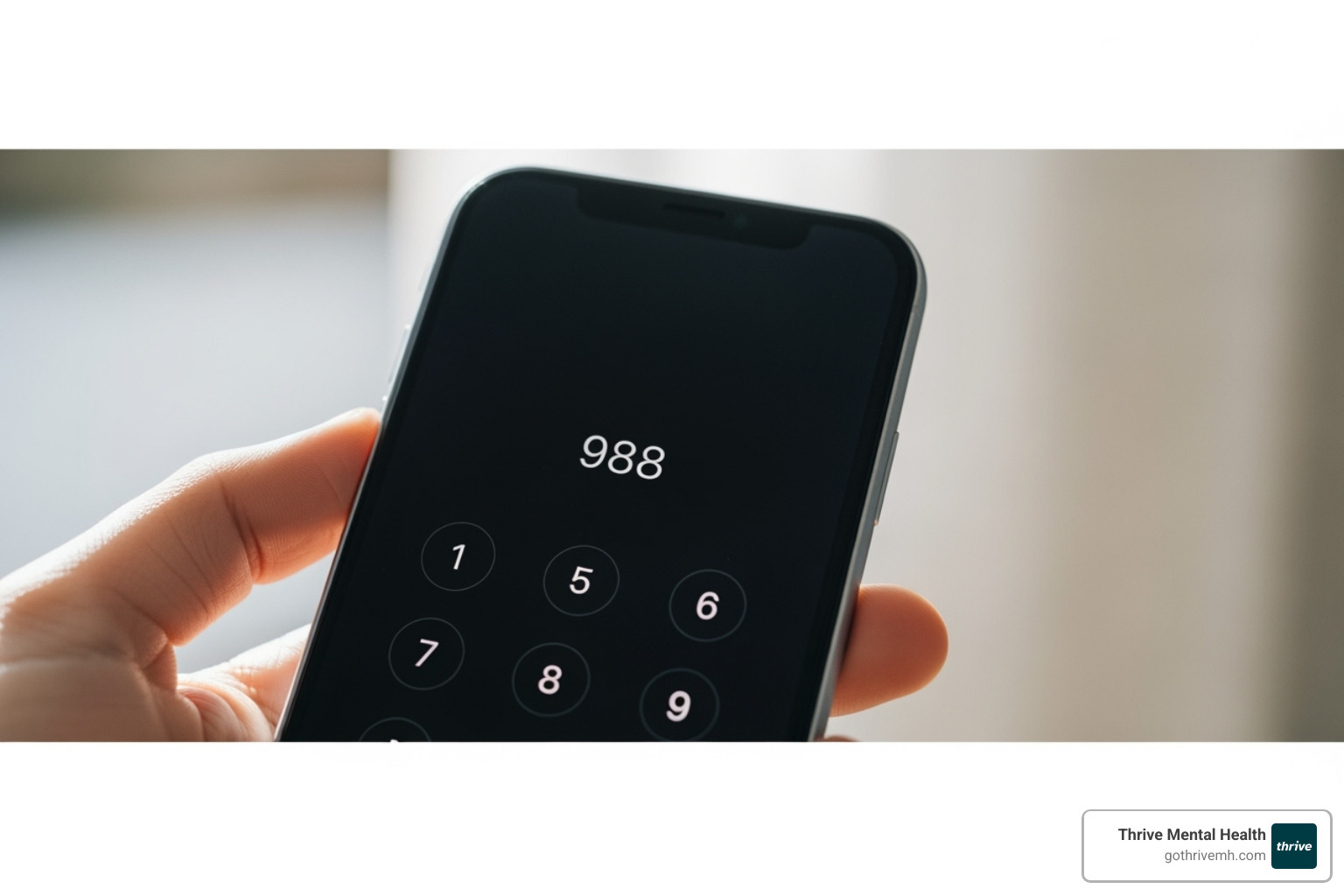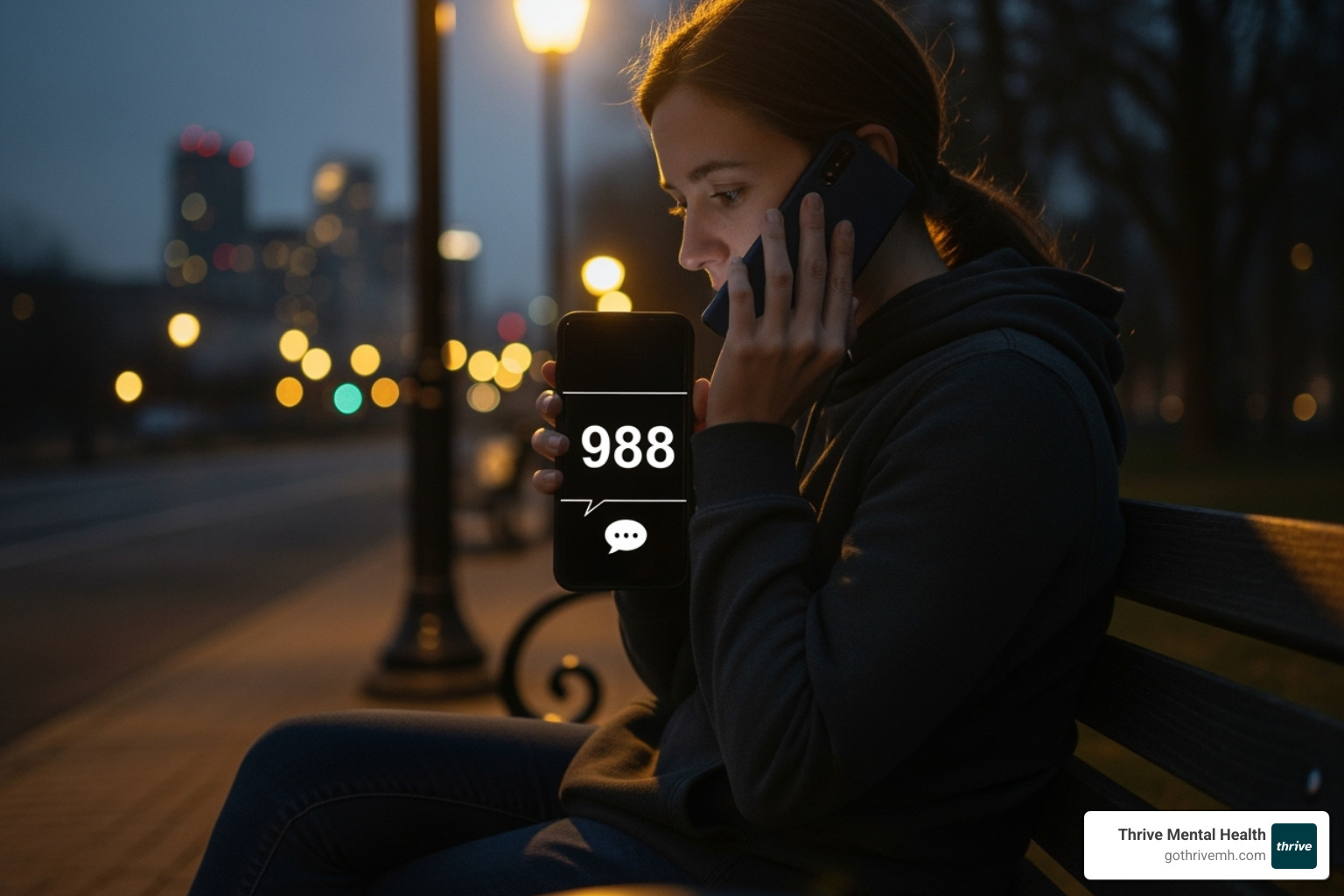988 Hotline: Because Everyone Needs Someone to Talk To

Why the 988 Hotline Exists: Immediate Help When Life Feels Overwhelming
The 988 hotline offers instant access to free, confidential crisis support 24/7. If you’re facing suicidal thoughts, emotional distress, or substance use challenges, trained crisis counselors are available to listen and provide help.
Quick Access Guide:
- Call: Dial 988 for immediate phone support
- Text: Send a message to 988 for text-based help
- Chat: Visit 988lifeline.org for online messaging
- Specialized Support: Press 1 for Veterans, 2 for Spanish, 3 for LGBTQI+ affirming counselors
- Cost: Completely free and confidential
- Availability: 24 hours a day, 7 days a week
Every 11 minutes, someone in the United States dies by suicide. In 2022 alone, over 950,000 youth and 1.6 million adults attempted suicide. These statistics represent real people who felt they had nowhere else to turn.
The 988 Suicide & Crisis Lifeline is a crucial bridge from despair to hope. It supports anyone facing mental health struggles, emotional distress, or substance use concerns—not just those contemplating suicide. You don’t need to be in immediate danger to reach out.
About 98% of people who contact the 988 Lifeline get the support they need without requiring additional emergency services. This remarkable success rate shows how effective compassionate, trained crisis counselors can be in helping people steer their most difficult moments.
As CEO of Thrive Mental Health, a behavioral health company serving Florida, I’ve seen how critical immediate crisis support is for connecting people to long-term healing. The 988 hotline is an essential first step, providing a vital human connection when it’s needed most.

What is the 988 Suicide & Crisis Lifeline?
The 988 hotline makes mental health crisis support as accessible as calling for a medical emergency. This three-digit number connects you to the 988 Suicide & Crisis Lifeline, a national network of trained crisis counselors.
Previously, the National Suicide Prevention Lifeline used a 10-digit number (1-800-273-8255), which launched in 2005. To make help easier to remember and access, Congress established 988, which officially launched on July 16, 2022. The old number still works and connects to the same service. You can learn more about the transition at The Lifeline and 988.
The 988 hotline‘s purpose is to provide confidential emotional support to anyone in a mental health crisis or emotional distress. This includes suicidal thoughts, but also mental health distress, substance use concerns, or any situation where you need someone to listen.
That’s where understanding different types of suicidal thoughts becomes important. Sometimes people experience what’s called passive suicidal ideation, which can be confusing and frightening. If this resonates with you, Understanding Passive Suicidal Ideation offers helpful insights into these complex feelings.

The Primary Goal: Immediate, Accessible Support
When you call the 988 hotline, a counselor’s main job is de-escalation—helping you manage intense emotions. They are trained to provide hope and connect you to resources for ongoing support.
Think of 988 as the mental health equivalent of 911. The 988 hotline aims to make reaching out for mental health support feel as natural as calling for a medical emergency, helping to reduce stigma.
The service is accessible to anyone, anytime, anywhere in the U.S. and its territories. No insurance or appointment is needed.
Sometimes it helps to recognize when you or someone you care about might benefit from this support. Understanding Early Warning Signs and Symptoms can help you identify these moments before they become overwhelming.
Who Should Use the 988 Hotline?
The 988 hotline is for everyone, whether you’re in crisis or worried about someone else. Individuals experiencing crisis of any kind can call, including those with suicidal thoughts, mental health struggles, or substance use challenges.
Worried family members and friends seeking guidance can also call to learn how to support a loved one.
You don’t need to be in a severe crisis. The 988 hotline is also for anyone who needs to talk about loneliness, anxiety, depression, trauma, stress, or relationship issues. A non-judgmental listener can make all the difference.
The counselors understand that reaching out takes courage, and they’re there to meet you wherever you are emotionally – no situation is too big or too small for their compassion and expertise.
How to Use the 988 Hotline: A Step-by-Step Guide
When you’re in a mental health crisis, you need a simple process. The 988 hotline is designed for accessibility, with help available 24/7 through three methods: calling, texting, or chatting online.
Multiple contact methods let you reach out in the way that feels most comfortable, whether by voice or text. There’s no wrong way to ask for help. This flexibility mirrors the benefits of Remote Mental Health Support.

Calling 988
When you call 988, you’ll hear an automated greeting with language options to ensure you can communicate comfortably.
The system then presents specialized menu options. Veterans can press 1 to reach counselors who understand military experiences. Spanish speakers can press 2 for support in Spanish. LGBTQI+ individuals can press 3 to connect with affirming counselors.
Your call is routed to the closest crisis center based on your area code. If that center is busy, the system connects you to a national backup center, so no call goes unanswered.
A trained counselor will create a safe, non-judgmental space for you to share. Conversations are completely confidential unless there is an immediate risk to safety. The counselor’s goal is to listen, understand, and help you through the crisis.
Texting 988
If talking feels overwhelming, texting 988 offers the same support through written conversation. Simply text 988 to start.
Like phone calls, you’ll receive prompts for specialized services. Texting “AYUDA” connects you with Spanish-speaking crisis counselors, while texting “PRIDE” gets you to LGBTQI+ affirming support.
Texting maintains your anonymity; you don’t have to share personal details. A crisis counselor will ask questions to understand your situation and help you process your feelings and find resources.
Many people find texting less intimidating, especially when feeling vulnerable, as it allows you to respond at your own pace.
Using the 988 Online Chat
For discreet support on a computer, use the online chat at Lifeline Chat. Spanish speakers can find their dedicated chat at 988lifeline.org/es/chat/.
Before connecting, a brief pre-chat survey helps the counselor understand your concerns, making the conversation more focused and helpful from the start.
The online chat prioritizes your privacy and security. While the system knows your general location via your IP address, you are never required to provide identifying information. The conversation remains confidential and secure.

No matter which method you choose, reaching out is a sign of strength. The 988 hotline exists because your life has value, and people are trained to help you through whatever you’re facing.
988 vs. 911: Knowing Which Number to Call
Knowing whether to dial 988 or 911 is crucial for getting the right help. 988 is for a mental health emergency, while 911 is for a medical or safety emergency.
| Feature | 988 Suicide & Crisis Lifeline | 911 Emergency Services |
|---|---|---|
| Purpose | Mental health crisis support, suicide prevention, emotional distress, substance use crisis. | Immediate physical emergencies: medical, fire, crime in progress. |
| Type of Emergency | Behavioral health crisis, emotional distress, suicidal ideation without immediate physical threat. | Life-threatening situations, physical harm, public safety threats. |
| Responder Training | Trained crisis counselors, often with backgrounds in mental health, de-escalation. | Emergency medical services (EMS), firefighters, law enforcement. |
| Typical Outcome | De-escalation, emotional support, safety planning, connection to community resources, referrals for ongoing care. | Dispatch of emergency responders (ambulance, fire truck, police car), physical intervention. |
The 988 hotline was created for behavioral health emergencies, focusing on providing someone to talk to rather than an in-person response. This approach is highly effective; for example, less than 1% of 988 calls in Michigan required a 911 response.
In Florida, we’re seeing more integration between mental health and emergency services, sometimes involving Crisis Intervention Team (CIT) Officers—police with special training for mental health crises. You can find more state resources at Suicide Prevention resources in Florida.
Both services are vital, and understanding when to use each is key.
When to Call the 988 Hotline
Call the 988 hotline when you’re struggling emotionally but are not in immediate physical danger. This includes feeling overwhelmed by emotional distress, such as intense sadness, anxiety, or an inability to cope.
If you’re having suicidal thoughts without immediate intent to act, 988 counselors can help create a safety plan and connect you to support. Learn more about the distinction at Active vs Passive Suicidality.
The 988 hotline also supports substance use challenges, offering guidance and connection to treatment resources.
Sometimes you might just need someone to talk to. There’s no crisis too small—if it feels big to you, it matters.
When to Call 911
Call 911 when there is an imminent risk of harm to yourself or others, meaning someone is in immediate physical danger.
If a suicide attempt is in progress, or for any medical emergency like an overdose, heart attack, or serious injury, call 911 for immediate medical help.
Call 911 for any life-threatening situation where seconds count. If you believe a mental health crisis requires law enforcement, you can request a CIT-trained officer when you call.
The bottom line? For immediate physical safety, choose 911. For an emotional or mental crisis, the 988 hotline offers specialized support.
Specialized Support and Confidentiality on the 988 Hotline
The 988 hotline understands everyone’s story is different, offering specialized services for unique community needs while ensuring strict privacy. When you reach out, you get help designed for your specific situation.
Your trust is paramount, which is why confidentiality is a promise. The 988 hotline system is built to protect your privacy. For a complete overview, review the 988 Suicide & Crisis Lifeline Fact Sheet.
Your Privacy and Confidentiality
Privacy concerns shouldn’t hold you back from reaching out. The 988 hotline is designed to protect your confidentiality.
You control what you share. Counselors only see your phone number (for calls) or IP address (for chats). You are not required to provide your name or other personal details. The focus is on supporting you, not collecting data.
Your anonymity is respected. You can remain completely anonymous. The counselors are there to listen and help, regardless of whether you share your name.
Information stays private except in rare emergencies. Conversations are confidential unless there’s an imminent risk to life that cannot be de-escalated through conversation. This happens in less than 1% of calls, and counselors will try to work with your consent to coordinate an emergency response.
Your data is never sold. The 988 hotline is administered by a nonprofit and does not sell caller information.
At Thrive Mental Health, we know trust is essential in mental health care. If you’re working through difficult experiences, you might find guidance in our resource on Expert Tips on Coping with Trauma for Better Mental Health.
Specialized Services for Diverse Communities
Recognizing that different communities face unique challenges, the 988 hotline offers specialized services to meet people where they are.

Veterans and military families can press ‘1’ after dialing 988 to connect with the Veterans Crisis Lifeline. Counselors are trained to understand the unique stressors of military service, from deployment to transition.
Spanish-speaking individuals can press ‘2’ after dialing 988, text “AYUDA” to 988, or use the Spanish-language chat. The Lifeline also offers translation services in over 250 other languages.
LGBTQI+ youth and adults face disproportionate mental health challenges and higher rates of suicide attempts. The 988 hotline offers specialized, affirming care to address this. Press ‘3’ after dialing 988 or text “PRIDE” to connect with trained counselors. This program has supported over 1.3 million LGBTQ+ youth since 2022. Learn more at Support for LGBTQI+ youth.
Deaf and Hard of Hearing individuals can dial 988 directly on a videophone or click the “Deaf/HoH” button on 988lifeline.org to connect with ASL-trained counselors.
These specialized services exist because culturally competent care saves lives. When counselors understand your background, they can provide more effective support.
Frequently Asked Questions about the 988 Hotline
People often have questions about how the 988 hotline works. Here are answers to some of the most common ones.
How is the 988 hotline funded and its effectiveness measured?
The 988 hotline‘s funding structure ensures it remains free and accessible. It receives federal support from the Substance Abuse and Mental Health Services Administration (SAMHSA), with significant budget proposals from the Department of Health and Human Services.
The funding model is sustainable because states can support local crisis centers. The National Suicide Hotline Designation Act of 2020 allows states like Florida to implement state telecommunication fees, similar to 911 funding, through phone bills.
SAMHSA grants also help states, territories, and tribal communities strengthen their local crisis response networks.
Effectiveness is measured by key performance metrics. In May 2024, the hotline supported over 610,000 contacts. The most encouraging statistic is that about 98% of callers feel less depressed, less suicidal, less overwhelmed, and more hopeful after speaking with a counselor. With less than 2% of calls requiring emergency services, it’s clear that compassionate conversation effectively de-escalates crises.
You can explore detailed data at SAMHSA’s 988 Performance Metrics.
What kind of training do 988 counselors receive?
When you call the 988 hotline, you connect with a highly trained professional. While training is custom to local community needs across over 200 crisis centers, all counselors must meet rigorous national standards.
Crisis intervention is the foundation of their training. Counselors learn to de-escalate intense emotions and guide people through crises. They also master suicide risk assessment to understand risk and create safety plans.
Active listening and empathy are core skills. Counselors are trained to hear the emotions behind your words, ensuring every conversation is supportive and non-judgmental.
Cultural sensitivity training helps counselors respect the diverse backgrounds of callers, and they receive ongoing education to ensure they provide the most effective support available.
Building resilience requires both immediate support and long-term strategies. We explore these approaches at Building Resilience Online: Coping Strategies for Long-Term Mental Health.
Can 988 help me find ongoing mental health treatment?
The 988 hotline is more than in-the-moment crisis support; it’s a gateway to ongoing care. Counselors are trained to help you take the next steps toward sustained wellness.
Connecting to local resources is a key function. The georouting system connects you to a local center where counselors know the mental health landscape in your area, including services available in Tampa Bay, St. Petersburg, and throughout Florida.
Referrals for therapy and support groups are a natural part of the conversation. Counselors can suggest specific options that match your needs.
Some crisis centers offer follow-up calls with your permission to check in and ensure you’ve connected with resources.
The 988 hotline is designed to be your entry point into a comprehensive system of support.
At Thrive Mental Health, we see this continuum of care daily. After 988 helps with the immediate crisis, our Intensive Outpatient Programs can provide the structured support needed for lasting recovery. Learn more about the long-term impact at The Benefits of Utilizing Mental Health Services.
Conclusion: Your First Step Towards Hope and Healing
The 988 hotline is a profound statement: no one should face their darkest moments alone. This guide has shown how this vital resource acts as a bridge from despair to hope, offering free, confidential, 24/7 support via call, text, or chat.
The 988 hotline is remarkable for its accessibility and effectiveness. Trained counselors are always ready to listen without judgment, and specialized services for veterans, Spanish speakers, and LGBTQI+ individuals ensure everyone receives understanding support.
About 98% of people who contact the 988 Lifeline get the help they need without requiring emergency services. This powerful statistic shows that compassionate conversation can change everything.
Calling the 988 hotline is often the first step in a healing journey. While crisis support is crucial for managing immediate distress, sustainable mental wellness usually requires ongoing professional care.
This is where the journey continues. While the 988 hotline excels at crisis intervention, lasting recovery often benefits from structured, evidence-based treatment. At Thrive Mental Health, we understand this continuum of care. Our virtual and in-person Intensive Outpatient (IOP) and Partial Hospitalization (PHP) programs throughout Florida are designed to pick up where crisis support leaves off.
We meet you where you are—whether in Tampa, Orlando, Jacksonville, or elsewhere in Florida—with flexible, expert-led care. The tools you develop in comprehensive mental health services can transform how you handle crises and thrive in daily life. Understanding The Benefits of Utilizing Mental Health Services can illuminate your wellness journey.
Asking for help is a sign of strength. Whether your first step is calling 988 or you’re ready for long-term support, you are choosing hope.
Your mental health matters. For ongoing support that builds on crisis care, explore our Vital Mental Health Services and find how we can support your journey to lasting wellness.